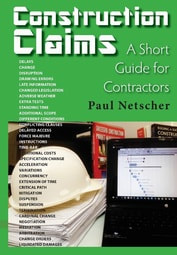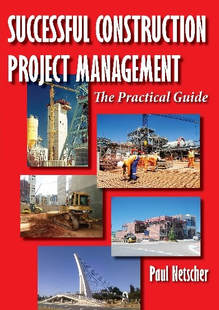 Get your copy of this easy to read book from Amazon. Available in eBook or paper Get your copy of this easy to read book from Amazon. Available in eBook or paper All too often, construction projects are finished late. Usually, the contractor is blamed. Contractors inevitably lose money because they are on the project longer than they planned to be. In addition, they are often penalised by the client for finishing late. But, is it always the contractor’s fault? Many of the delays experienced on a construction project are due to circumstances beyond the contractor’s control, which means that the contractor could have claimed an extension of time, usually including the additional costs that they incurred as a result of the delay. So why don’t contractors claim for these delays? Unfortunately, contractors often fail to submit delay claims because:
Contractors must learn to be more focused on the contractual issues as well as the construction work. Those who don’t understand their contractual rights will run into trouble, costing them money which could ultimately sink their company. The contract document is there to protect the client’s rights as well as the contractor’s rights, and no client can object to a contractor’s legitimate delay claim. Indeed, in the course of my career, I’ve been involved in over 120 projects for a multitude of different clients and many of these projects have involved variation and delay claims. Almost every one of these claims was settled amicably, even though some involved substantial increases to both the value and the time of the project. In nearly every case we went on to do further projects with the client. Of course, it is important that every delay claim is backed up by sound logic and information. Regrettably, some contractors only focus on submitting claims, often claims which are only desperate attempts to claw back time and money that has been lost due to their own mistakes. Many of these claims have no sound basis and are a waste of the contractor’s and the client’s time. In my next article, I’ll discuss some reasons the contractor can’t claim a delay for. When Can Contractors Claim for Additional Time? Contractors can claim for additional time when:
 To read more about the author’s books and find out where you can purchase them visit the pages on this website by clicking the links below:
To read more about the author visit the page 'Paul Netscher' Want to contact Paul Netscher please enter your details on 'Contacts' Find out how Paul Netscher can help you construction management construction project management
0 Comments
Leave a Reply. |
Archives
June 2024
Note: We welcome genuine comments, especially comments that add additional information to the subject matter in the article. We however reserve the right to remove inappropriate comments, which includes comments that have nothing to do with the subject, comments that include inappropriate language, and comments that are an advertisement for a product or company, or which include an advertising link. Comments must be in English. We will not enter into discussion on why a particular comment was removed.
CategoriesCopyright 2016 - The attached articles cannot be reproduced for commercial purposes without the consent of the author.
The opinions expressed in the attached articles are those of the writer. It should be noted that projects are varied and different laws and restrictions apply which depend on the location of the contractor and the project. It's important that the reader uses the supplied information taking cognisance of their particular circumstances. The writer assumes no responsibility or liability for any loss of any kind arising from the reader using the information or advice contained herein. "I have what I consider some of the best books on construction management."
Books are available from: Amazon.com Amazon.co.uk takealot.com kalahari.com Amazon.in Amazon.de Amazon.fr Amazon.it Amazon.com.au Powell's Fishpond uread bokus Amazon.ca Amazon.es Other retail stores Available in paperback or on Kindle "28 YEARS OF CONSTRUCTION PROJECT MANAGEMENT EXPERIENCE, DEVELOPING SUCCESSFUL CONSTRUCTION PROJECT MANAGERS AND BUILDING SUCCESSFUL CONSTRUCTION COMPANIES"
|



 RSS Feed
RSS Feed




